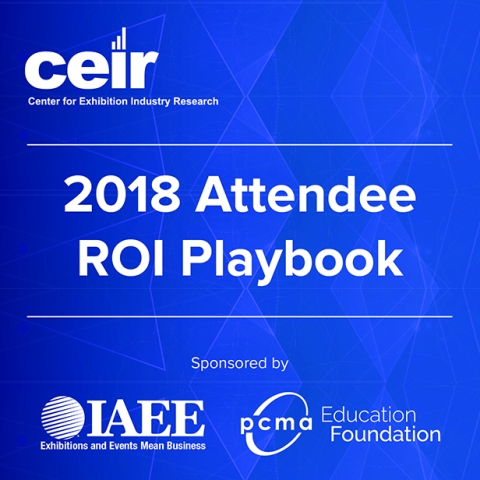CEIR Releases Second and Third Fact Sheet in Attendee ROI Playbook Series

The Center for Exhibition Industry Research (CEIR) has released its second and third fact sheets in its 2018 Attendee ROI Playbook series, a multiple fact sheet series that identifies general attendee practices and insights on differences by specific attendee categories.
Released late last month, “Fact Sheet Two: B2B Exhibitions Top-Ranked for Value in Meeting Business Information & Purchasing Decision Needs” explores the range of sources that business professionals who attend B2B exhibitions relied upon to meet their business information and purchasing decision needs in comparison to other primary sources relied upon.

“This research documents the power of face-to-face marketing,” explained Nancy Drapeau, CEIR senior research director.
She continued, “When asked to rank the order of information sources used primarily to meet their business information and purchasing decision needs, B2B exhibitions and communications with vendors and suppliers are tied for number one ranking.”
Drapeau added that when looking at the percentage of professionals that rate B2B exhibitions as number one or number two, B2B exhibitions break away and prevail as the most valued information source – 57 percent versus 41 percent for communications with vendors and suppliers.
“Today we live in trust-challenged times where digital media gives professionals access to more information than ever,” said Cathy Breden CEO of CEIR.
She continued, “This research reveals that business professionals look to resources they trust to determine what is real and what is fake. B2B exhibitions rise to the top in helping them achieve this.”
In addition to B2B exhibitions, the report identifies five additional information sources B2B exhibition attendees primarily relied upon to meet their business information and purchasing decision needs, and reports the ranking and results of these sources in order of value.
Released earlier this week, “Fact Sheet Three: Pre-Planning and Tracking Activities – Impact on Perceived ROI/Value of Attending,” documents the positive effects pre-event planning and tracking activities have on an attendee’s opinion of a B2B exhibition they attend.
“This study evaluates the impact these activities have on attendee Net Promoter Scores (NPS), which measure customer loyalty and indicate a brand’s growth potential,” Drapeau explained.
She continued, “Findings reveal that those who engage in pre-planning have a higher NPS (55 percent) compared to those who do not (29 percent). The same pattern is evidenced for attendees who engage in tracking activities while visiting an exhibition.”
This five-page report provides the following:
- Overall rate of pre-planning among attendees as well as for six specific activities
- Which pre-planning activities have the most impact on driving higher NPS scores
- Overall rate of tracking activities while visiting an exhibition among attendees as well as for nine specific activities
- Which tracking activities have the most impact on driving higher NPS scores
- Who decides which activities will be tracked (individual or whether boss is involved)
“Giving registrants the tools via an event’s website to pre-plan and focus their objectives for attending are worthwhile,” Breden said. “Providing user-friendly ways to track their activities through an event website, mobile app and other relevant tools preferred by attendees also maximize attendee value – and ultimate satisfaction – with an event.”
She added, “Thanks to support provided by the PCMA Education Foundation, CEIR is able to explore various ways in doing so through this study. CEIR thanks the Foundation for supporting our efforts in providing this vital research to our industry.”
Along with the PCMA Education Foundation, IAEE was also a sponsor of the 2018 Attendee ROI Playbook. As a result, all reports released in this series, including “Fact Sheet One: Decision to Attend and Factors Driving Attendee ROI/Value” can be obtained free of charge HERE.
Don’t miss any event news! Sign up for any (or all) of our e-newsletters HERE & engage with us on Twitter, Facebook, LinkedIn & Instagram!


Add new comment